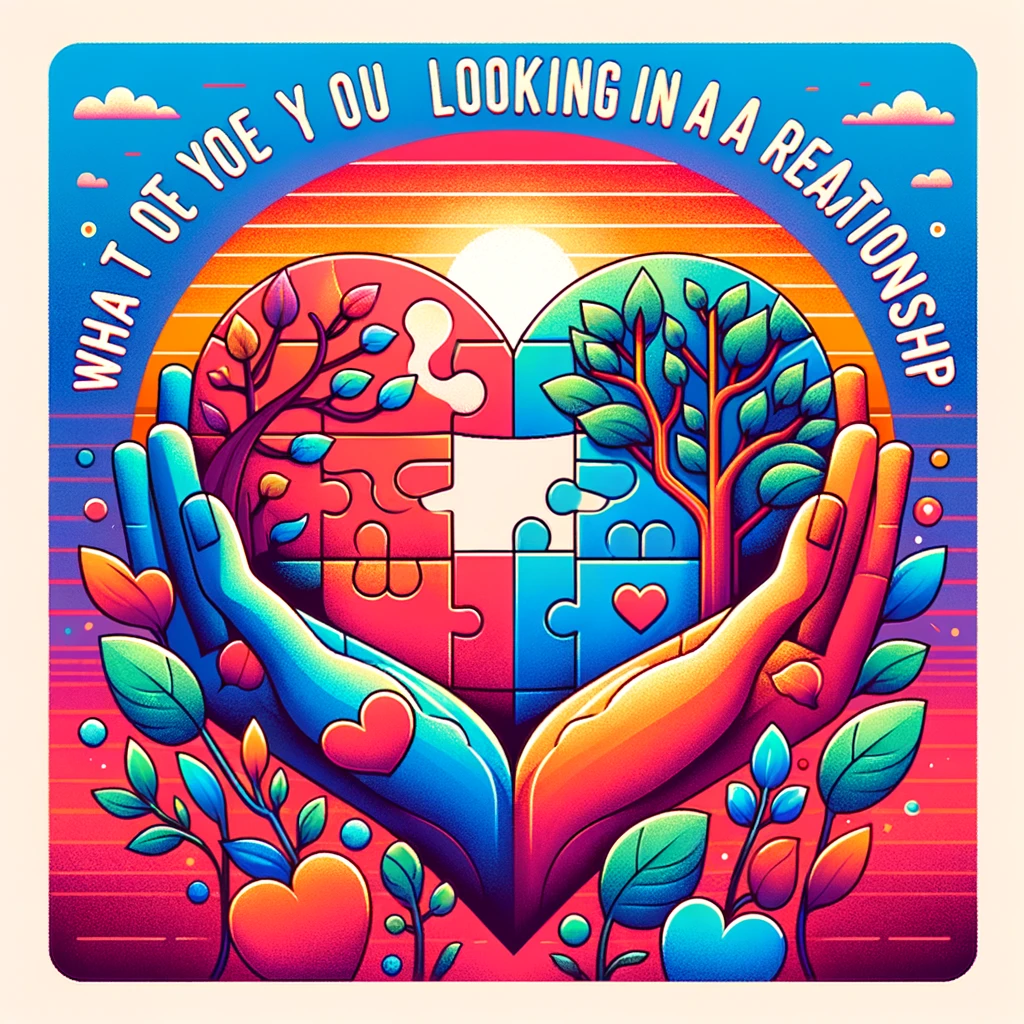Key factors for What Are You Looking for in a Relationship? Explore shared values, emotional compatibility, and supportive partnerships in your search for emotional fulfillment and long-term compatibility.
Embarking on the search for a fulfilling relationship is a journey that many individuals can relate to. The yearning to experience emotional connection and find long-term compatibility often drives us to explore dating, relationships, and the complexities they entail.
In this blog, we will delve into the key factors that are worth considering when searching for a meaningful relationship. By gaining insights and understanding into these aspects, you can improve your chances of finding emotional fulfillment and forging a lasting bond.
What Are You Looking for in a Relationship Here Are Some Major Points To Notice
Knowing Yourself

Deep self-awareness is an invaluable starting point before entering into any relationship. Understanding your own values, goals, and priorities provides you with a solid foundation upon which to build a healthy and fulfilling connection. Spend time reflecting on yourself, your desires, and your boundaries.
Ask yourself essential questions
What are your passions and interests? What are your non-negotiable values? What are your long-term goals? By uncovering who you truly are, you can effectively communicate your needs and expectations to potential partners.
For example, let’s consider the case of Sarah, who has always been an ambitious career-minded woman. Understanding her own values and goals helped her identify the need for a partner who is supportive of her aspirations and willing to strike a work-life balance.
Through self-reflection, Sarah set clear boundaries and communicated her expectations upfront when dating, ensuring a foundation of mutual understanding and respect.
Also read – WHAT GUY’S WANT IN LONG-DISTANCE RELATIONSHIP?
Core Values and Compatibility

Core values are the fundamental principles that shape and define who we are. They influence our perspectives, decision-making, and relationships. In a healthy, lasting relationship, alignment of core values is crucial. Take the time to identify your own core values, whether it’s honesty, trust, respect, or compassion.
Consider which values are non-negotiable for you. Next, explore how these values may align with those of your potential partner. Engaging in open, honest conversations about values can provide insight into the compatibility and stability of the relationship, contributing to long-term fulfillment.
Research conducted by Dr. Helen Fisher, an anthropologist and relationship expert, has shown that shared values play a significant role in relationship satisfaction and longevity. In her study, she found that individuals who reported high-value similarity with their partners experienced higher levels of relationship satisfaction.
For example, if you highly value honesty and integrity, it would be important to seek a partner who shares those values to establish trust and create a strong foundation for the relationship.
Emotional Compatibility

Emotional compatibility forms the basis of a deep, meaningful connection. It involves shared understanding, empathy, and effective communication. Trust is a vital component of emotional compatibility, as it establishes the foundation for vulnerability and openness in a relationship.
Building trust requires consistent actions, honest communication, and mutual respect. Furthermore, effective communication allows for the expression of thoughts, emotions, and needs. It fosters a safe space for open dialogue, active listening, and understanding. A solid emotional bond enhances the rapport between partners and serves as a pillar of support during challenging times.
In a study by Dr. John Gottman and Dr. Robert Levenson, researchers observed couples’ interactions and classified them into different categories, one of which was “emotional engagement.” They found that couples who demonstrated high levels of emotional engagement, such as actively listening, showing empathy, and validating each other’s emotions, reported higher relationship satisfaction over time.
Cultivating emotional compatibility by prioritizing effective communication and emotional responsiveness creates a strong base for a fulfilling relationship.
Goals and Future Plans

While it is important to appreciate the present moment, understanding each other’s long-term goals and future plans is vital in creating a harmonious relationship. Consider discussing career aspirations, family goals, personal growth, and other significant areas of life.
Although differences in goals are not necessarily deal-breakers, it is crucial to identify common ground and assess the willingness to support and compromise when necessary. Open communication, mutual understanding, and shared visions of the future contribute to a relationship’s sustainability and satisfaction.
For instance, imagine a couple, James and Emily, who share the goal of starting a family in the future. By openly discussing and aligning their family goals, they establish a shared vision, ensuring that their relationship is built upon a solid foundation that can withstand the challenges and responsibilities of parenthood.
Sharing similar aspirations allows partners to support each other’s dreams and work together as a team toward a common future.
Support and Partnership

A fulfilling relationship should consist of support and partnership, where both individuals encourage and uplift each other. Emotional support entails being there for one another during challenging times, offering a listening ear and providing a safe space for vulnerability. Practical support involves sharing responsibilities and working collaboratively to handle life’s demands.
Partnerships thrive when both individuals feel seen, valued, and appreciated. Assess whether a potential partner exhibits supportive behaviors such as active listening, empathy, and encouragement. Additionally, consider how they navigate challenges and conflicts as indicators of their partnership potential.
Dr. John Bowlby, a distinguished psychologist, emphasized the significance of secure attachment and support in relationships. His research demonstrated that individuals in relationships with secure attachment styles, characterized by emotional responsiveness and availability, experience higher levels of relationship satisfaction and intimacy.
Partners who foster a sense of security through supportive behaviors create an environment that allows the relationship to flourish and grow.
Conclusion
Finding a rewarding relationship that brings emotional fulfillment and long-term compatibility requires self-awareness, open communication, shared values, common goals, and a supportive partnership. Nurture your own growth, remain true to yourself, and navigate the journey with patience and resilience.
Remember, finding the right person to embark on this journey requires time and effort. Trust that by prioritizing your own well-being and aligning your values with those of a potential partner, you increase the likelihood of creating a deeply fulfilling and lasting connection.
May your search for a meaningful relationship be filled with self-discovery, growth, and ultimately, the joy of finding a partner who complements and enhances your life.
FAQ’s
What are you looking for in dating?
Be honest and communicate your intentions and desires clearly. Share your true intentions and goals for dating, whether it’s a casual relationship or something more serious. Mention qualities and attributes you value in a partner and focus on finding compatibility.
What do you want in a relationship list?
Consider your own values, needs, and desires. Include aspects like communication, emotional support, shared values and goals, trust and honesty, compatibility, mutual respect and equality, personal growth, and intimacy.
What to reply to “What are you looking for?
Respond with openness and honesty. Say you’re open to meeting new people and seeing where it leads. Mention if you’re looking for casual dating or something more serious.
How do you say you’re looking for a relationship?
To express that you are looking for a relationship, you can say:
“I am actively seeking a meaningful and committed relationship. I am ready to connect with someone on a deeper level and build a lasting partnership.”
Should I tell him I’m looking for a relationship?
“Deciding whether or not to tell someone you’re looking for a relationship depends on the stage of your interaction and personal preferences. It’s important to consider timing, compatibility, and open communication. Ultimately, use your judgment to determine when and how to express your desire for a relationship.”
What to say when a guy asks what are you looking for?
When a guy asks what you are looking for, you can respond with honesty and clarity. Here are a few possible ways to answer:
“I’m looking to meet someone with whom I can form a genuine and meaningful connection. I am open to exploring a potential relationship if the right person comes along.”
“I’m at a point in my life where I am ready for a committed and loving relationship. I hope to find someone who shares similar values and goals.”
“I’m open to seeing where things go and meeting new people. I’m ultimately looking for a strong emotional connection and compatibility.”
“I’m not rushing into anything, but I am interested in finding a partner who I can build a lasting and fulfilling relationship with.”
Remember to tailor your response to your own intentions and desires. It’s important to be genuine and communicate what you truly want in a relationship.
Proudly powered by Ultimate Blog Hub

